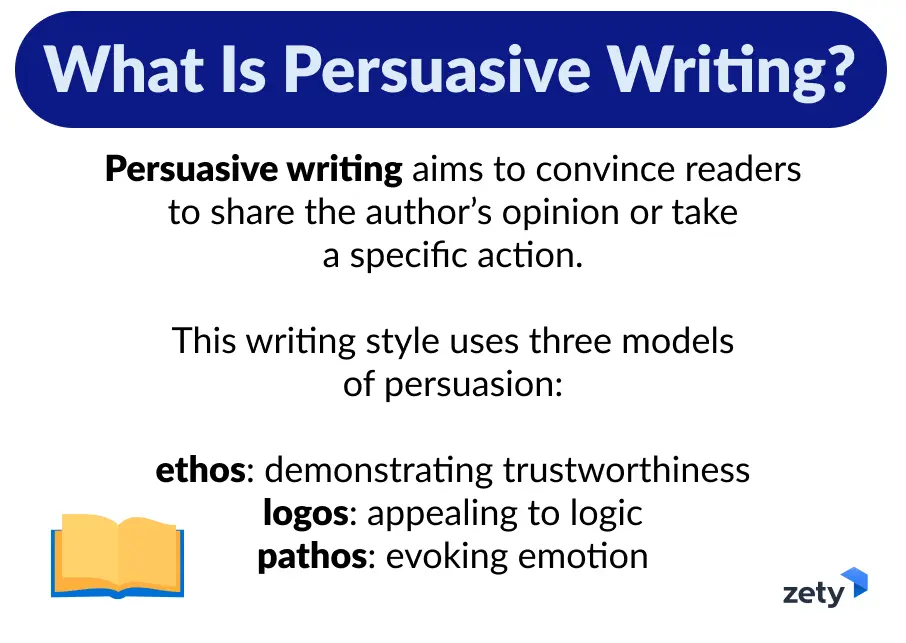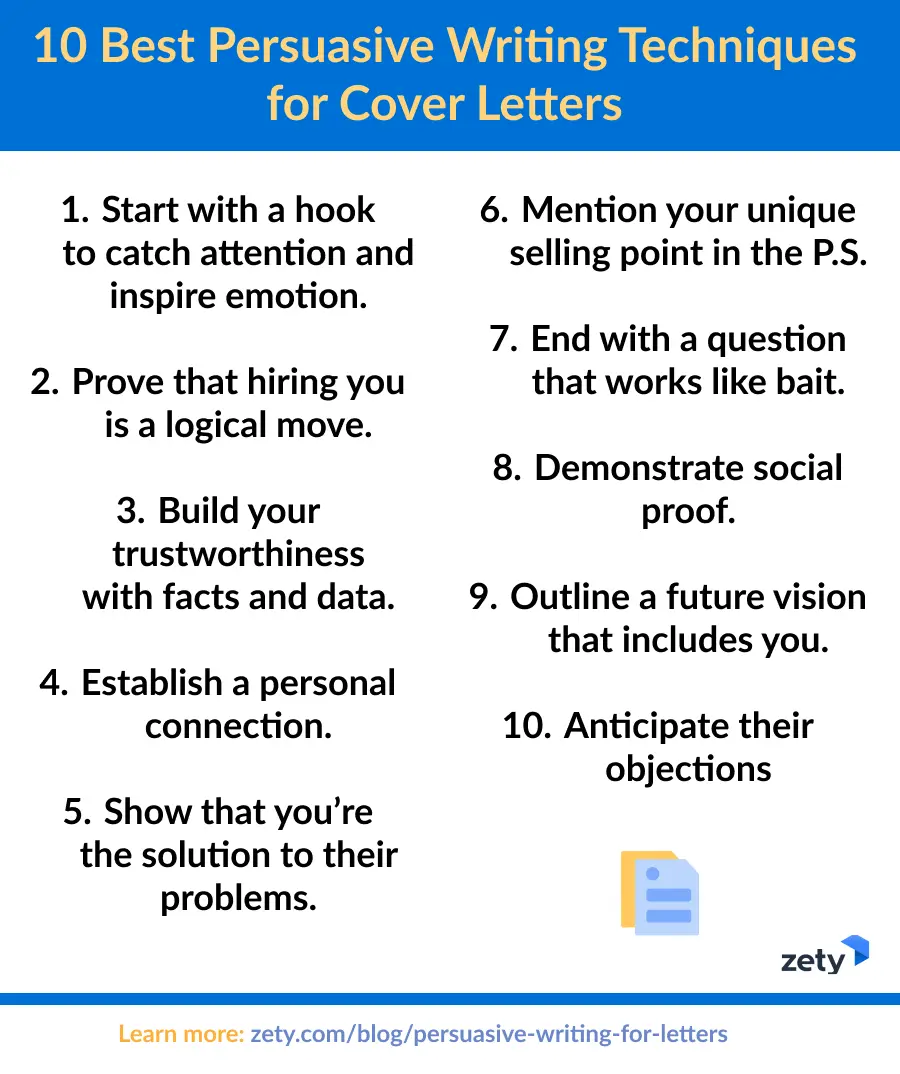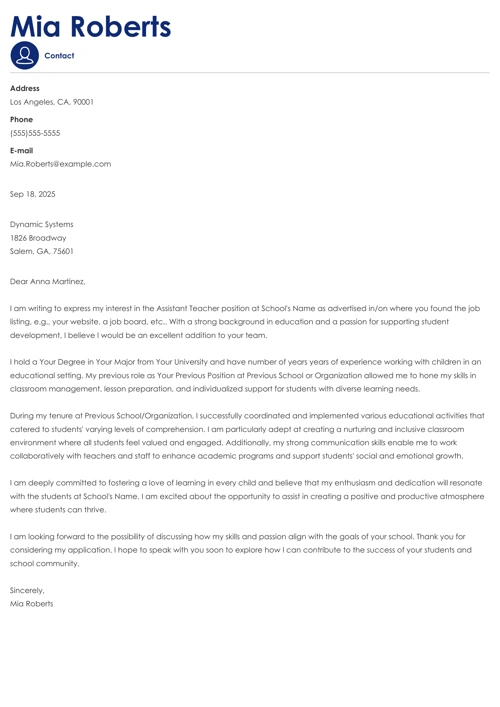Your cover letter aims to convince the recruiter that you’re the best fit for the job. But even when your qualifications are perfect, you may need extra luck to get noticed. Persuasive writing is far more effective than wishing upon a star, so stretch your fingers and get ready. Once you’ve learned these persuasive writing techniques for cover letters, you may want to try them all.
Key Points:
- Persuasive writing methods can be applied to cover letters to create a personal connection with the recruiter.
- Adding relevant, measurable achievements from previous jobs makes you appear more trustworthy.
- Demonstrate empathy by offering solutions to the recruiter's or the company's problem.
- Inspiring emotion in the hiring manager can make them more inclined to contact you.
What Is Persuasive Writing?
Persuasive writing aims to convince readers to share the author’s opinion or take a specific action. This writing style uses three models of persuasion: ethos (demonstrating trustworthiness), logos (appealing to logic), and pathos (evoking emotion) to establish a connection with the reader.

Does it apply only to cover letters? Definitely not! You can use persuasive writing techniques for business proposals, project pitches, speeches, and essays. Professionals in sales and marketing widely use these methods, so some of them have likely influenced you in the past—and without your knowledge!
How to Use Persuasive Writing Techniques in Cover Letters
Sigmund Freud had the following rule for writing letters: “Leave unmentioned what the recipient already knows, and instead tell him something new.” Yes, you should apply it to cover letters, too. The recruiter already knows you want a job, so it’s not worth mentioning. They also know what’s in your resume, so forget about repeating that. You must tell them something new, and the following techniques will help you do it:
1. Open Your Letter With a Hook
Hooks are statements designed to catch the reader’s attention. They can be surprising, funny, or even shocking: this way, they evoke emotion and encourage continuing reading. Here are a handful of examples:
Persuasive Cover Letter Writing Hooks—Examples
- When I received the Best in Finance award, I knew my life wouldn’t be the same.
- Your advertising campaign has shaken me to the core.
- Let me say it straight: I love your products.
- I never wanted to work in marketing.
- Porsche, Lamborghini, Ferrari. These are just a few of my former clients.
- Most people hate working in customer service. Me? I love it.
2. Show That Hiring You Is the Most Reasonable Thing to Do
Recruiters have a problem to solve: filling a vacancy. They want to find the best solution to this problem—and you want to be this solution. Your cover letter must convince them that hiring you is the next logical step. How? By responding to the job requirements from A to Z. In the middle part of the letter, write 3–5 bullet points highlighting your key skills. Of course, they must have the same skills that appeared in the job advertisement.
3. Use Facts and Data to Show You’re an Expert
If you work in a role with easily measurable KPIs, you should be able to recall a handful of professional achievements and back up your claims with numbers. Exceeding targets, boosting sales, increasing retention rates, and improving efficiency are just a few examples of measurable accomplishments. When you’re applying to companies that expect tangible results, showing real data can help you to be seen as a trustworthy candidate.
4. Add a Personal Anecdote
Do you have a personal history related to the company? Maybe you’ve followed its development, or your uncle worked there decades ago? Recalling a personal connection helps to inspire emotion in the reader. Plus, as one of our surveys established, recruiters often scan cover letters in search of referrals, so they’ll likely notice your message.
5. Mention a Problem That Resonates With the Company
First step: show that you can put yourself in the company's shoes. Proving that you empathize with them is a great way to catch the recruiter’s attention: after all, they are looking for someone who understands the business. Next step: explain that you’re the solution to the problem.
6. Save Your Unique Selling Point for the P.S.
The end of a cover letter matters as much as the start. A postscript is guaranteed to hook the reader. But don’t waste it on saying: “Give me a call!” Drop a bomb instead. Your unique selling point should inspire the recruiter to call you straight away. Here’s an example:
Persuasive Writing in a Cover Letter P.S.—Examples
- P.S. I would love to bring my proven track record of increasing campaign ROI by 35% to your team and help make your upcoming product launch a resounding success.
- P.S. I recently developed a custom tool that reduced manual processing time by 50% for my current team. I’d be thrilled to share my coding expertise and innovation with your company.
- P.S. My last campaign achieved a 20% click-through rate—let me do the same for your audience.
- P.S. Over the past year, I implemented an employee retention program that reduced turnover by 15%. I’d be excited to develop strategies like this to support your team.
- P.S. I consistently maintain a 98% customer satisfaction rate and have upsold 60% of my assigned accounts. I look forward to enhancing your client relationships in the same way.
- P.S. My analysis work identified a $1.2M savings opportunity for my previous employer. I’d be thrilled to apply my data-driven insights to optimize your operations.
7. Ask a Question at the End of Your Letter
Questions make readers think. When you put a question at the end of your letter, the recruiter won’t simply put the letter down—they’ll feel prompted to get an answer. Add some tempting information to the question, and it will work like bait. For example: “Did you know that optimizing your website layout could easily improve your sales?” or: “Would you like to know how I won the Star in Advertisement award?”
8. Utilize Social Proof
Humans often copy the behaviors of others. You can use this herd mentality to your advantage by recalling those who worked with you: satisfied clients, former students, patients, or even managers. It can work especially well for job seekers who freelanced or had their own business for a while. As always, keep things professional: rather than saying that your former boss often invited you to family BBQs, say that your knowledge was highly respected by your superiors.
9. Present a Tempting Future Vision
By the end of your cover letter, a recruiter has a good overview of your qualifications. Now is the time to paint a stellar vision of the organization’s future: a future that includes you. Express an ambitious goal that you can achieve in your desired role, but beware—your goal must align closely with theirs. Here are a few examples:
Persuasive Cover Letter Closing—Examples
- I’d love to empower members of disadvantaged communities in the metropolitan area through outreach activities designed in collaboration with community leaders.
- I can’t wait to start creating the influencer campaign to spread product awareness and boost sales for Ethereal Beauty.
- I’m eager to support the student body of Lincoln High through personalized instruction and meaningful class activities as well as help academically gifted students compete in the National Academic League.
10. Anticipate Objections
Think of any reason the hiring manager could be against hiring you. Are you switching careers? Do you have little work experience? Let’s say you’re a 22-year-old education major applying for a team leader position. The recruiter might worry you’re too inexperienced for a leadership role. Here’s what you could write:
Persuasive Cover Letter—Example
You might be thinking: “Why would I hire someone without management experience?” That’s a fair concern, and here’s my response: while it’s true that I haven’t held leadership positions yet, I’ve gained experience managing groups of students during my studies. It allowed me to try various management styles and embrace managerial duties such as delegating tasks, giving recognition, providing feedback, and building effective teams.
Summary

Embracing persuasive writing in cover letters is an effective way to combine presenting your relevant qualifications with adding a touch of character and style. As with many writing tasks, composing a cover letter comes easier to those who have a way with words, and it’s likely more difficult for number-oriented job seekers.
The final tip? Don’t use all persuasive writing techniques in one letter! Try using three methods maximum, so your writing style doesn’t outweigh your qualifications for the job.
About Zety’s Editorial Process
This article has been reviewed by our editorial team to make sure it follows Zety's editorial guidelines. We’re committed to sharing our expertise and giving you trustworthy career advice tailored to your needs. High-quality content is what brings over 40 million readers to our site every year. But we don't stop there. Our team conducts original research to understand the job market better, and we pride ourselves on being quoted by top universities and prime media outlets from around the world.


